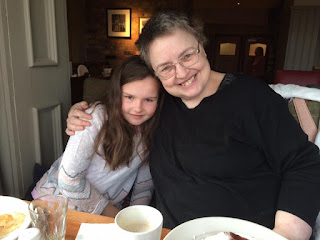Guest Post: Sue Barnard - A is for ...
One of the things I want to do with this blog is invite other writers to tell me their own A-Z writing tips. With that in mind, today I am delighted to welcome Sue Barnard onto the blog. Sue's first novel, The Ghostly Father, is due out in February, from Crooked Cat Publishing, and she went above and beyond the call of duty and has shared 7 things beginning with A.
Seven things beginning with A by Sue Barnard
Seven things beginning with A by Sue Barnard
AUTHOR
 |
| © Antony Rufus | Dreamstime Stock Photos |
That's you. Sorry to state the obvious, but every novel needs at least one author. You might find that your characters can start to take over (I once had one who completely surprised me by saying something which went on to change the entire course of the sub-plot!), but they still need you to get them on to the page!
ANTAGONIST
This is the person you love to hate. One of the principal sources of conflict throughout the novel, the antagonist is the person who seems hell-bent on spoiling everything for the hero and/or heroine. The antagonist can be male or female, young or old; a selfish, cantankerous old biddy, a grasping old miser, a sullen teenager or a six-year-old school bully. But (particularly) in romance novels, as part of the Happy Ever After ending, the antagonist must always get some kind of come-uppance. This doesn't necessarily have to take the form of a punishment - if the antagonist can be made to see the error of his or her ways, have a change of heart and become a reformed character, this makes for a much more satisfactory outcome. For a fine example of how this works, look no further than the archetypal miser-turned-philanthropist: Ebenezer Scrooge.
ACTION
Just because your novel is a romance doesn't mean it can't have action, drama or excitement. This is where your sub-plot comes into play. Your hero and heroine can work together to solve a crime, find a missing child, investigate a family mystery or even foil a terrorist plot, whilst falling in love along the way.
ADJECTIVES & ADVERBS
These are the writer's tools of description. Adjectives describe people or things (eg a tall man, a black dog), whilst adverbs describe actions. Adverbs can be either single words (which usually end -ly) or phrases. They're useful if you need to get your word-count up, but if you're working to a tight word-count, or need to speed up your narrative, it's often better to dispense with the adverb and use a stronger verb instead.
For example:
Mary looked at John with a conspiratorial glint in her eye (eleven words)
Mary winked at John (four words)
ATMOSPHERE/AMBIANCE
 |
| © Ridvan Sekercioglu | Dreamstime Stock Photos |
One of the best pieces of writing advice I was ever given was: You have five senses. Use them all. What do your characters see, hear, taste, smell or feel? Use these sensations to bring your characters to life and carry your reader along with them.
A strong sense of place can add immeasurably to a novel, particularly if the action takes place in a romantic setting such as Paris or Venice. Obviously it helps if you've visited the place yourself, but if not, take a look on YouTube; you can get a really good feel for a place by looking at it through someone else's eyes. Google is also your friend, but you do need to be selective with your descriptions if you don't want to end up sounding like a guide book, an instruction manual or a telephone directory.
ADOPTION
This is another fine source of conflict - who knows what skeletons lie lurking in family closets, waiting to jump out and reveal guilty secrets? And there's plenty of scope for happy reunions as families are reunited after years of separation. Just one word of warning here though: don't, whatever you do, have your hero and heroine meet, fall in love, and then find out that they're long-lost siblings. That way lies heartache.
ALTERNATIVE
Don't be afraid to push the boundaries. Mix genres if you want; there's nothing wrong with adding a touch of the paranormal to your romance. Vampires, werewolves and ghosts don't necessarily have to be baddies! And feel free to take an existing story and adapt it, or even give it an alternative ending if you don't like the original. This is exactly what I did for those most famous of lovers Romeo and Juliet, in my novel "The Ghostly Father" (Crooked Cat Publishing, February 2014) which tells what might have happened if things had worked out differently for them.
Sue Barnard - Blog
Sue Barnard - Blog

Thank you so much for visiting my blog, Sue! Wishing you loads of luck with your new novel. x
ReplyDeleteThank you - and many thanks for inviting me on here!
DeleteGreat advice, Sue. And good luck with the novel.
ReplyDeleteThanks Miriam! :-)
DeleteCongratulations on kicking off the blog!
ReplyDeleteThank you Kate! :-)
Delete